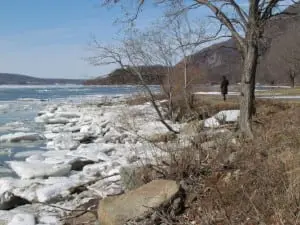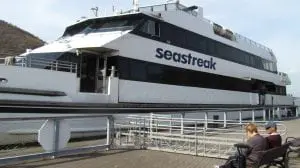Coal tar, boat club, cruise boats and Dockside pose issues
By Michael Turton
The Cold Spring waterfront will receive a great deal of attention in 2014. Significant issues remain unresolved – including an agreement for the cleanup of toxic coal tar and the impact of that project on the Cold Spring Boat Club. Village trustees will also revisit docking fees and consider policies necessitated by the increased use of the dock in 2013.
Shoreline protection will also be in the news as the village benefits from a grant to design measures to protect Dockside from erosion and flooding – initiatives that will become more urgent in the years ahead if water levels in the Hudson River rise as predicted. Also waiting in the wings is a yet-to-be-determined agreement between the village and the State of New York regarding management of the Dockside property.
Coal tar cleanup agreement pending
In October 2013, the New York Department of Environmental Conservation (DEC) agreed to an extensive cleanup of coal tar in the area of the Cold Spring Boat Club after the Village Board rejected a proposal to remove approximately 20 percent of the toxic deposits, a by-product of a manufactured gas plant that operated on the site in the late 19th century. The village has until Jan. 31, 2014 to confirm to DEC that the boat club building will be removed and vacated by Sept. 1, a measure required because coal tar deposits lie directly beneath the structure.
In an email to The Paper, Cold Spring Mayor Ralph Falloon said the status of the agreement with DEC is “questionable” because it is not yet known what state the site will be in after the cleanup, possibly making replacement of the building difficult. “I am optimistic that we will have some type of agreement in writing (through) good faith for both sides,” he said.
The Cold Spring Boat Club was established in 1955 on lands leased from the village, owner of the property. Last fall, the possibility that removing the club’s building would negate the lease was raised; however at an Oct. 26 meeting, Falloon, supported by Village Attorney Mike Liguori, indicated that is not the case. The mayor made it clear that he wants to see the boat club return after the cleanup. “This is not an excuse to do away with the boat club,” he said at that time.
However, the club may not completely mirror its past when the lease is rewritten. Falloon said that the village Comprehensive Plan will be considered as part of the process. That document calls for continued benefits to club members but also recommends greater community access to club facilities and increased revenue generation to benefit the village. The club currently pays no taxes or rent.
Protecting Dockside
Early in 2013, more than 40 residents attended a workshop that examined how climate change is likely to affect the village and what can be done about it. DEC officials highlighted a startling prediction – that Hudson River water levels at Cold Spring will rise by four feet by 2080. Erosion is already an issue at Dockside, the undeveloped parkland north of the bandstand.
In November, DEC announced a grant of $75,000 to design measures to reduce erosion and increase the property’s ability to withstand higher water levels, storm surges and wave action while also improving aquatic habitat. Shoreline management measures will be discussed at a public meeting on Thursday, Jan. 16, at the village fire hall beginning at 7 p.m. Milone & MacBroom Inc. has been hired to design demonstration projects for Dockside that can also serve as a model in similar settings elsewhere.
Cruise boats draw praise – and criticism
Fall 2013 saw a surge in dockage at Cold Spring by cruise boats based in New York City and New Jersey. On a number of autumn weekends three boats docked simultaneously, sending hundreds of visitors to Main Street for an afternoon stay. Restaurants and cafes were the biggest winners, often filling to capacity immediately after the boats docked. One cruise line canceled more than 40 cruises out of Cold Spring but may return next year once its boats are properly outfitted to use the dock.

The influx of tourists created no parking problems, but not everyone was enthralled by the boom in foot traffic. Speaking at a Nov. 9 Village Board meeting, Deputy Mayor Bruce Campbell referred to it as a “saturation of tourists” that “swamp the restaurants (and) swamp the waterfront.” A resident complained that the boats interfere with fishing and crabbing from the dock.
“The increased use of the dock by cruise boats showed (its) value and the desire to visit our village,” Falloon told The Paper via email. “I believe we need to better manage … docking to (prevent) overwhelming our village all at once.” He said one solution may be to stagger docking times, adding that there is a need to ensure that people can also simply enjoy the dock.
Bad weather recently forced cancellation of a Village Board meeting at which dockage fees and policies were to be discussed. The issue will undoubtedly be taken up early in the New Year.
Dockside agreement in 2014?
The Dockside property, the former site of a popular local restaurant, is now owned by the New York State Office of Parks, Recreation and Historic Preservation. An agreement through which the Village of Cold Spring would manage and potentially develop the site for recreational uses has been pending for several years.
With so many other pressing waterfront issues to be addressed it seems unlikely an agreement will be reached soon, however Falloon is somewhat optimistic. “I would like to come to agreement regarding Dockside in 2014,” he told The Paper, though he indicated he has remaining concerns. “I feel we do all the work to maintain their property … with no resources or help from them.”
It will be a busy year at the waterfront – and at Village Hall.
File photos by M. Turton


As a struggling, Main Street business owner I was very unhappy to read Mr. Campbell’s comments regarding the tourist boats that came to town during 2013; his remarks seem all too typical of what seems to be the anti-business sentiment that exists in Cold Spring.
For his information, those boats, including the Sea Streak, were a lifesaver for the shops and the restaurants and for most of us, we made more money from their visits than we made during the Holiday season.
Cold Spring is not typical when it comes to shopping– most retailers make nearly all their money in the last quarter of the year while summer and fall are slow. Here it’s just the opposite as the Village just about shuts down once the winter begins. People just don’t do their holiday shopping here anymore like they used to.
Now we are hearing rumblings (again) that somehow the residents were inconvenienced by our good fortune, i.e. the boats that docked here. Something must be done about it! Let me guess- whatever is done somehow will involve an additional tax or fee on the cruise boats so that the Village an get their piece of the action.
Meanwhile, those of us who have invested in our businesses pay our rents and taxes all year round. Although many of us don’t live in town, we make up the commercial base that helps defray the cost of residential taxes for those that reside here. Maybe Mr. Campbell and others similarly situated who don’t seem to want business on Main Street, should research what the fiscal implications would be if Cold Spring lost this tax base.
For starters, check out Put Valley (where I live) where there’s no Main Street and no businesses. Heck, the liquor store just closed and we lost our wonderful hardware store a few years ago too. The entire burden of county, town and school taxes falls squarely on the shoulders of the homeowners with no relief in sight.
Most of us in PV would love to have a shopping district like yours at Oregon Corners, but that’s never going to happen. And if someone like Mr. Guillaro came here with $9 million to invest, I guarantee you he’d be welcome with open arms.
Maybe Mr. Campbell’s comments were taken out of context, as I highly doubt he is “anti-business” as mentioned. I often see Bruce on Main Street, in and out of the shops. Just because he doesn’t go into all of the shops doesn’t mean he is anti-business.
There probably should be an extra fee or tax charged to the boats that choose to dock here to ensure that legitimate businesses with insurance are docking versus anyone with a boat and a rope. What’s going to happen when the constant docking takes its toll? Who will foot that bill? Certainly not the merchants. I would think that a fee for each boat would likely go towards maintenance and upkeep so that the dock doesn’t go slowly crumbling into the river (again).
Maybe Putnam Valley could have a business district if they had more street lights. I hear that makes all the difference when people consider where they shop.
I think that Mr. Campbell’s remarks were an example of what is perceived as an “anti-business” attitude that exists in the Village. As far as the dock, I understand that there is a fee schedule in place already and presume that there is some allocation in the Village budget for repairs and maintenance. All of that money comes from taxes, and the business owners pay their fair share of same through rent, property tax, sales tax, etc. As far as Putnam Valley having a business district, there are plenty of street lights; that’s not the problem. We are just too close to the Miracle Mile, a.k.a. Route 6. No way that small businesses can compete with Walmart, Home Depot, Sears, et al which are five minutes away from Oregon Corners.
I think instead of pointing fingers we should strive to better our community for the betterment of all its residents. Docking of vessels has become a good thing for our local businesses. We need to make sure that there is a plan in place to repair our docks in the event damage occurs and the taxpayers should not have to foot the bill for that at all. This is where all parties need to come together and create a harbor management plan for our waterfront area. Larger vessels should in my opinion pay a little more per square foot to dock as part of the application process. I’m not suggesting raising the linear foot amount so high it chases everyone out of here, but fair is fair.